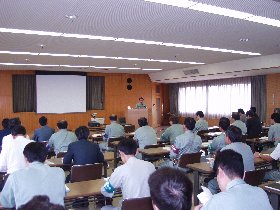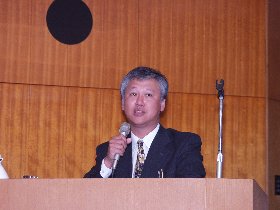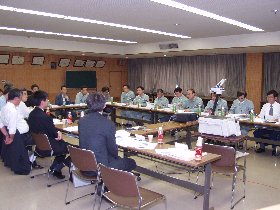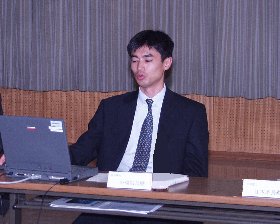|
|
 |
On 20th June 2002, the 38th Safety Caravan visit was held at Takasago Works, Kobe Steel, Ltd., which is located in Takasago-shi, Hyogo Prefecture. |
Safety Presentation
|
About 50 persons, including the employees of Takasago Works and cooperating companies, attended the Safety Presentation.
At the beginning of the Presentation, Mr. Ryuichi Hori, Superintendent of Takasago Works gave an address and said, "As a company contributing to the nuclear industry, we are striving to promote nuclear safety and would like to make our activities fruitful by frankly exchanging information and opinions regarding how to promote future safety management."
|

Safety Presentation
|
After the address, Mr. Umezu, Secretary-General of NSnet introduced NSnet activities, followed by a lecture entitled "To Ensure Safety: Activities at Hamaoka Nuclear Power Station" delivered by Mr. Motonobu Emoto, Superintendent of the Nuclear Training Center, Hamaoka Nuclear Power Station/Hamaoka Nuclear Construction Center, Chubu Electric Power Co., Inc.
|
During the lecture, implementations for ensuring safety at Hamaoka Nuclear Power Station were shown.
As an organization:
(1) A message giving safety the highest priority was transmitted by the President,
(2) Station management policies were transmitted by the Superintendent of overall practices,
(3) Activities to improve communication.
As individuals:
(1) Acquiring basic knowledge as engineers, |

Mr. Emoto
|
(2) Promoting ethics ("Being honest with the truth," "Know your limits," "Disclose the facts regarding what has happened," "Be proud of working with skill that makes individuals happy.")
(3) Implementing systematic education and training to become specialists.
Safety information exchange session |

Safety information exchange session
|
At the safety information exchange session, at the request of Kobe Steel, Ltd., Mr. Chiaki Kojima, Deputy Manager of the Reactor Maintenance Group, Maintenance Department, Fukushima-Daiichi Nuclear Power Station, Tokyo Electric Power Co., Inc., was invited to make an in-depth presentation of the good practice "Activities to Cope with Aging Degradation " from the peer review of Fukushima-Daiichi.
Subsequently, details of the good practice were actively discussed and information and opinions were exchanged. In addition, Kobe Steel, Ltd. showed their activities for promoting nuclear safety culture at the works, which was followed by information and opinion exchange.
|

Mr. Kojima
|
Major information and opinions were as follows:
- Why did you choose this good practice as an instance to be introduced (NSnet)?
- We chose it because it might involve items that can be fed back to designers and manufacturers through the maintenance of machinery carried out by the user (Kobe Steel, Ltd.)
- Do you offer original education programs regarding cask functions at the stage of manufacturing casks (NSnet)?
- We have established the necessary education and training programs for individual workers within the ISO system. Not for everyone, but relevant persons, for example, for those who handle casks, we developed textbooks showing how to use them and shielding functions. We recognize it as very important education (Kobe Steel, Ltd.)
- Do workers take such training sessions at least once (NSnet)?
- When manufacturing new machinery, we gather on-site workers and teach them the use of the machinery and design fundamentals. For example, in the process of a surface finishing of the stainless steel of the cask body, polishing workers have a question of why they have to polish it more than as compared with general machinery. We explain them that it is to "improve decontamination performance." Workers respond differently when they understand points in term of design and use. (Kobe Steel, Ltd.) |
|
|







